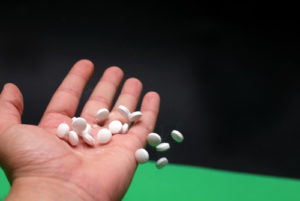
When it is time to dispose of old medicines, there are recommended guidelines to prevent drug abuse, protect your identity and personal health information (PHI).
Although it may seem like an easy solution, flushing medicines down the sink or toilet is actually not recommended, unless the disposal instructions on the prescription label specifically direct you to do so, according to the Environmental Protection Agency (EPA).
How to Safely Dispose of Medications
Your neighborhood may have a drug take-back program, which will allow you to bring unused drugs to a location for proper disposal. However, if this is not available to you and the label does not instruct how to dispose of the medication, the CDC recommends mixing the meds with coffee grounds or kitty litter so that they are not easily recognizable. Then, place the mixture in a sealed bag or empty container and throw it out with the household trash.
The American Pharmacists Association also recommends crushing solid medications or dissolving them in water (which also applies for liquid medications) before mixing them in with the undesirable substances mentioned above.
When in doubt, speak with your pharmacist. Typically, pharmacists are easily accessible and can guide you on how to properly dispose of your unused meds.
They also recommend protecting your personal information by scratching out any content presented on the prescription label before throwing away the bottle.
It is very important to dispose of unused prescription drugs in the appropriate way. If the proper precautions are not taken, children, pets, or people who intentionally go through the trash may get their hands on your unused medications.
Consequences of Taking the Wrong Drug
There are some prescription medicines that can be harmful if taken by someone other than who the prescription was meant for, the CDC indicates, so it is also not recommended to give your unused medications to family or friends.
Keep in mind: disposal of medications is not the only thing that is important when trying to keep members of the household safe. You should ensure that medicines are also being stored safely.
In one case scenario, a three-year-old child happened to wander into his grandmother’s bedroom while the parents were visiting and conversing in the living room with the grandparents. The grandmother had her pills on a table next to her bed. The child found the pills. Opened the containers and started putting them in his mouth, thinking they were candy. Fortunately, the boy was not harmed as those particular meds were not controlled substances nor habit forming. They were mild sleep inducers. They didn’t know how many he had swallowed, but apparently, it wasn’t a lot. This situation could have been much worse though, since the grandmother did have controlled medications in containers right next to the sleep inducers.
This is why, even if you are visiting someone, make sure they have their meds safely stored away. Either keep prescriptions locked up, or stored somewhere high and out of the reach of children.
Teenage Curiosities
When it comes to teens, we head into a new arena. Many teenagers, especially adolescents are curious individuals, sometimes foolishly curious. If you have meds, especially controlled substances, and have teenagers living with you, hide the medications!
As per prp.jasonfoundation.com, “More teenagers and young adults die from suicide than from cancer, heart disease, AIDS, birth defects, stroke, pneumonia, influenza, and chronic lung disease, COMBINED.”
Indeed with statistics such as this, being vigilant about teenagers would be an understatement.
In Closing
If you have small children or teens, or even pets, make sure you have your medications stored away properly where they cannot get to them!
